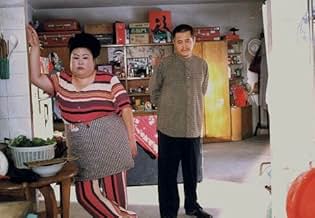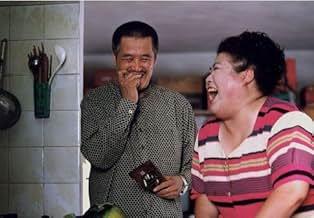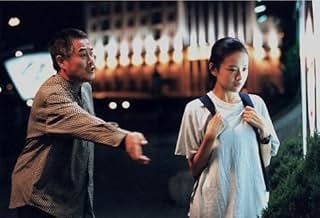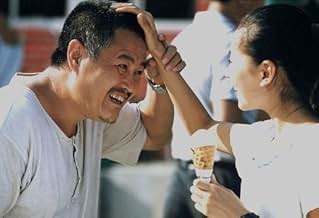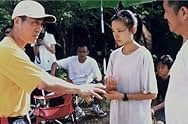CALIFICACIÓN DE IMDb
7.3/10
4.3 k
TU CALIFICACIÓN
Agrega una trama en tu idiomaAn aging bachelor has to engage his old, laid-off friends to keep a blind girl happy as a masseuse at a non-existent massage parlor.An aging bachelor has to engage his old, laid-off friends to keep a blind girl happy as a masseuse at a non-existent massage parlor.An aging bachelor has to engage his old, laid-off friends to keep a blind girl happy as a masseuse at a non-existent massage parlor.
- Dirección
- Guionistas
- Elenco
- Premios
- 5 premios ganados y 4 nominaciones en total
- Dirección
- Guionistas
- Todo el elenco y el equipo
- Producción, taquilla y más en IMDbPro
Opiniones destacadas
There is, in this world, many parents, siblings or grandparents are, but they always angry, especially when it comes to their loved ones. His "generosity" is full of contempt, anger and I think that self-frustration for failing to more fortunate children or grandchildren or more committed to themselves. This giving is worth very little, because the recipient feel humiliated, and love is hate and what does not grow in his heart, first by himself, by being forced to receive from whoever stain, and second, that which gives because he knows that, at bottom, despises him.
There is in this world, and fortunately, people who are eager to give and to serve because he feels playing the role for which he was born, then, when given the heart, there is nothing more rewarding for humans to feel that someone has released a fix or which has helped improve their quality of life. Being that really works, do not expect rewards, for the simple flow makes you feel full, and instead wanted to thank you, it is he who gives them for being in a state of abundance.The sincere and loving act of giving is an act of creation because it is spreading, confidence and hope.
It is this that comes Zhao, a man old enough and who, wishing to mate with a plump woman conflictive existence, just knowing Wu Ying, a sweet blind teenager who, motherless and abandoned by her father with his stepmother, he began to feel that, this woman is charging the resentment what she feels for his volatile father. Zhao, take time to under the beautiful Wu and begin a long quest to get her access to the happy times, while getting to make sense of their existence.
Yimou's film, soon to look at the classic Charles Chaplin "City Lights" but his personal touch and very oriental, manages the film with feel and certain charm, though - it must be said - without the immense magic and poetic warmth that has the now classic work of Charlot. However, at the end one feels that, with grace and wisdom, "Happy Times", has shown a path that gives meaning to existence, and so, well deserve our warmest applause.
There is in this world, and fortunately, people who are eager to give and to serve because he feels playing the role for which he was born, then, when given the heart, there is nothing more rewarding for humans to feel that someone has released a fix or which has helped improve their quality of life. Being that really works, do not expect rewards, for the simple flow makes you feel full, and instead wanted to thank you, it is he who gives them for being in a state of abundance.The sincere and loving act of giving is an act of creation because it is spreading, confidence and hope.
It is this that comes Zhao, a man old enough and who, wishing to mate with a plump woman conflictive existence, just knowing Wu Ying, a sweet blind teenager who, motherless and abandoned by her father with his stepmother, he began to feel that, this woman is charging the resentment what she feels for his volatile father. Zhao, take time to under the beautiful Wu and begin a long quest to get her access to the happy times, while getting to make sense of their existence.
Yimou's film, soon to look at the classic Charles Chaplin "City Lights" but his personal touch and very oriental, manages the film with feel and certain charm, though - it must be said - without the immense magic and poetic warmth that has the now classic work of Charlot. However, at the end one feels that, with grace and wisdom, "Happy Times", has shown a path that gives meaning to existence, and so, well deserve our warmest applause.
No longer partnered, artistically or domestically, with the stunning Gong Li, director Zhang Yimou has probably redeemed himself with Party satraps through his engaging serio-comic "Happy Days." (He's been in and out of hot water with past films.) Destined to reach a miniscule audience in theaters, this touching film ought to be widely viewed when released for sale or rental.
Set in an unnamed Chinese city (definitely not Beijing), the story revolves around retired factory worker Zhau, just over fifty, and a blind teenager, Wu Ying, stepdaughter of the corpulent and avaricious woman the impecunious Zhau seeks as a wife. Wu Ying, blind since early childhood from a tumor, has to deal not only with her witch of a stepmom (dad fled from her and is supposedly in a far off city working to send money to bring his daughter to him) but with her stepbrother, a bulbous slobus amoebus training to match his mother's nastiness.
Zhau has a covey of good friends. His first get rich scheme, hatched up with his closest friend, is to "restore" a derelict bus in a park to its pristine state so it can be rented for quick, hot sheet assignations ("Happy Times Hotel"). Americans will find the Chinese take on non-marital, catch-as-catch-can sex naive but it reflects tension balanced by humor in a country where the citified young seek freedoms their elders never enjoyed.
The core of the story is Zhau's attempts to take care of Yu Wing after the evil stepmom throws her at Zhau and tells him to get her out of the house and keep her out. With his friends, all equally hovering near or under the poverty line, Zhau sets Yu Wing up as a masseuse in a fake massage parlor in a decrepit abandoned factory, the legitimate kind of parlor, not the type I heard about when an Army officer in severalAsian countries (Yu Wing was trained to give massages).
I won't reveal the lengths Zhau and his gang go to in their effort to sustain Yu Wing and make her happy. Some of their scheming is very funny. The ending reflects, hardly for the first time, Zhang Yimou's skill not only as a top director but also as a talented storyteller.
I've never seen the actor and actress who play the leads before. They simply blend their performances convincingly into a seamless story that says more about the possibilities and rewards of empathy and the joys of caring than it does about modern China. The locales here range from an affluent downtown to a condemned, empty factory. There's hardly any politics. It's sad, though, that a decent, retired factory worker can't spring for a 25 yuan Haagen Daz small cone offered in a shop that could have been imported from Main Street.
Put this one on your to-rent list!!
Set in an unnamed Chinese city (definitely not Beijing), the story revolves around retired factory worker Zhau, just over fifty, and a blind teenager, Wu Ying, stepdaughter of the corpulent and avaricious woman the impecunious Zhau seeks as a wife. Wu Ying, blind since early childhood from a tumor, has to deal not only with her witch of a stepmom (dad fled from her and is supposedly in a far off city working to send money to bring his daughter to him) but with her stepbrother, a bulbous slobus amoebus training to match his mother's nastiness.
Zhau has a covey of good friends. His first get rich scheme, hatched up with his closest friend, is to "restore" a derelict bus in a park to its pristine state so it can be rented for quick, hot sheet assignations ("Happy Times Hotel"). Americans will find the Chinese take on non-marital, catch-as-catch-can sex naive but it reflects tension balanced by humor in a country where the citified young seek freedoms their elders never enjoyed.
The core of the story is Zhau's attempts to take care of Yu Wing after the evil stepmom throws her at Zhau and tells him to get her out of the house and keep her out. With his friends, all equally hovering near or under the poverty line, Zhau sets Yu Wing up as a masseuse in a fake massage parlor in a decrepit abandoned factory, the legitimate kind of parlor, not the type I heard about when an Army officer in severalAsian countries (Yu Wing was trained to give massages).
I won't reveal the lengths Zhau and his gang go to in their effort to sustain Yu Wing and make her happy. Some of their scheming is very funny. The ending reflects, hardly for the first time, Zhang Yimou's skill not only as a top director but also as a talented storyteller.
I've never seen the actor and actress who play the leads before. They simply blend their performances convincingly into a seamless story that says more about the possibilities and rewards of empathy and the joys of caring than it does about modern China. The locales here range from an affluent downtown to a condemned, empty factory. There's hardly any politics. It's sad, though, that a decent, retired factory worker can't spring for a 25 yuan Haagen Daz small cone offered in a shop that could have been imported from Main Street.
Put this one on your to-rent list!!
This film will either get to you like a death in the family, or leave no lasting impression on you whatsoever. I'm among those who fit in with the first part. Maybe family death is exaggerating but that doesn't matter, this is still A VERY POWERFUL FILM. This film proves that ZHANG YIMOU IS THE BEST DIRECTOR ALIVE (as Alferd Hitchcock and Akira Kurosawa are dead). The best actor in this film is actually the blind girl (sure, she's no River Pheonix, but who is?) who always gives you the impression that she's blind (unlike some American actors in American films). Yet she happens to know more than you think in the end (no spoilers on that). To see this film on the big screen was too much, 10 out of 10. Oh, and watch out for Hero, from the same director of this.
This is one of the most touching films I've ever seen. I actually don't think I can find the words in English to describe how wonderfully director Zhang Yimou seems to understand the finer points of human emotions. I was absolutely touched with Happy Times, and consequently sought out his work, "The Road Home", which I found was equally excellent.
I wanted to wait to write a review of this film until I felt I could compose something fitting, but realized for me, the comments must come from the heart. In short, I'd rather skip any attempt to summarize the film or intellectually categorize it into some literal form that doesn't really fit. It is slowly immersing into unselfish love for another, while relating a sense of light comedy. My recommendation is that you try to see it on IFC or one of the other Independent film channels when it's available.
On Golden Pond is the only American film I can think of that evokes the same level of emotion provoked by Zhang Yimou.
I wanted to wait to write a review of this film until I felt I could compose something fitting, but realized for me, the comments must come from the heart. In short, I'd rather skip any attempt to summarize the film or intellectually categorize it into some literal form that doesn't really fit. It is slowly immersing into unselfish love for another, while relating a sense of light comedy. My recommendation is that you try to see it on IFC or one of the other Independent film channels when it's available.
On Golden Pond is the only American film I can think of that evokes the same level of emotion provoked by Zhang Yimou.
Zhao is a 50 year old unemployed loser making one last attempt at finding love. He courts a portly divorcee, but keeps having to lie to pass himself off as a better catch than he really is. Eventually, of course, the lies backfire. Zhao tells his sweetheart that he is the manager of a fancy hotel. She responds by foisting her blind stepdaughter off on him, confident that he can easily find her employment at his fancy hotel.
What follows is a funny, unlikely and touching relationship between Zhao and the blind girl Wu. While Zhao is terribly misguided, constructing elaborate deceptions to keep Wu "employed" at the non-existent hotel, he does these wrong things for the right reasons. Zhao does find love, but it isn't the woman or the love he expected.
This is an excellent film and there are three big reasons why: First of all, it's directed by Zhang Yimou who may well be the best director alive. This isn't a masterpiece like "Raise the Red Lantern," but seeing the phrase "Directed by Zhang Yimou" should be enough to tell you the next two hours will be well spent.
The second and third reasons are Benshan Zhao as Zhao and Jei Dong as Wu. Zhao is a respected Chinese comedian, but the role here is really a mixture of comedy and drama. Zhao gives the mixture exactly the right touch. But the real revelation is Jei Dong. I found myself wondering through the entire movie if she were really blind. She is that good. (And I still don't know the answer.)
Don't expect a laugh out loud comedy if you see this movie. It is very funny in places, but frequently that humor is very uncomfortable. And frequently happy times aren't really what they seem.
What follows is a funny, unlikely and touching relationship between Zhao and the blind girl Wu. While Zhao is terribly misguided, constructing elaborate deceptions to keep Wu "employed" at the non-existent hotel, he does these wrong things for the right reasons. Zhao does find love, but it isn't the woman or the love he expected.
This is an excellent film and there are three big reasons why: First of all, it's directed by Zhang Yimou who may well be the best director alive. This isn't a masterpiece like "Raise the Red Lantern," but seeing the phrase "Directed by Zhang Yimou" should be enough to tell you the next two hours will be well spent.
The second and third reasons are Benshan Zhao as Zhao and Jei Dong as Wu. Zhao is a respected Chinese comedian, but the role here is really a mixture of comedy and drama. Zhao gives the mixture exactly the right touch. But the real revelation is Jei Dong. I found myself wondering through the entire movie if she were really blind. She is that good. (And I still don't know the answer.)
Don't expect a laugh out loud comedy if you see this movie. It is very funny in places, but frequently that humor is very uncomfortable. And frequently happy times aren't really what they seem.
¿Sabías que…?
- TriviaDirector Zhang Yimou issued a casting call via the Internet for role of the blind girl. Eventual lead Dong Jie was selected from some 40,000 girls who auditioned for the role.
- Versiones alternativasSPOILER: There are two cuts of this film; the original Chinese Theatrical Cut and an International Cut, which is six minutes longer. The International Cut features more content in the early scenes when the two couples come to the Happy Times Hut hoping to have sex. In the Chinese cut, these scenes are more ambiguous as to what the couples have in mind. Additionally, the International Cut has a longer and very different conclusion. In the Chinese cut, after Zhao (Benshan Zhao) writes the letter supposedly from Ying's father, the film cuts to him reading it to her as the credits start to role. In the International Cut, however, after Zhao leaves the restaurant in which he writes the letter, he is hit by a car. In hospital, his friends come to see him, finding the letter to Ying (Jie Dong). Upon returning to her apartment, however, they find it deserted. A tape recording Ying has made and left behind explains that she knew all along the Happy Times Hotel didn't exist, but she didn't mind as they were the happiest days of her life. She then explains that she is going to Shenzhen. After the message is finished, Fu (Biao Fu) plays it again, reading aloud Zhao's letter at the same time. The film then cuts to Ying walking along a crowded city street as the credits role.
- ConexionesFeatured in Late Night with Conan O'Brien: Martin Lawrence/Los Lobos (2002)
Selecciones populares
Inicia sesión para calificar y agrega a la lista de videos para obtener recomendaciones personalizadas
- How long is Happy Times?Con tecnología de Alexa
Detalles
- Fecha de lanzamiento
- País de origen
- Sitios oficiales
- Idioma
- También se conoce como
- Happy Times
- Locaciones de filmación
- Productoras
- Ver más créditos de la compañía en IMDbPro
Taquilla
- Presupuesto
- USD 1,900,000 (estimado)
- Total en EE. UU. y Canadá
- USD 240,093
- Fin de semana de estreno en EE. UU. y Canadá
- USD 31,084
- 28 jul 2002
- Total a nivel mundial
- USD 361,000
- Tiempo de ejecución1 hora 42 minutos
- Color
- Mezcla de sonido
- Relación de aspecto
- 1.78 : 1
Contribuir a esta página
Sugiere una edición o agrega el contenido que falta

Principales brechas de datos
By what name was Xing fu shi guang (2000) officially released in Canada in English?
Responda







